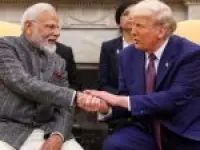
How Tennis Player Radhika Yadav’s Murder Became A Battleground For Honour, Hate, And Online Misogyny
The murder of 25-year-old tennis player and coach Radhika Yadav by her father in Gurugram has not just shaken the nation’s conscience, but it has now become a battleground for online vitriol.
While the family mourns and police probe the brutal killing, a section of the right-wing has taken to social media to vilify the young woman, using her brief appearance in a 2023 music video “Karwaan” with a Muslim man to launch character attacks and indirectly justify the so-called “honour killing.”
View this post on Instagram
Radhika, once a rising tennis talent, had transitioned to coaching after a sports injury and opened a successful academy in Gurugram, helping train young athletes.
But this financial independence and public visibility, including her appearance in a song titled Karwaan, reportedly became a source of conflict with her father, 49-year-old retired banker Deepak Yadav.
According to police sources, Deepak confessed that villagers from their native Wazirabad often taunted him for depending on his daughter’s earnings and questioned her character.
Also, read| Mocked For Relying On Daughter’s Income: Why Did Father Kill Tennis Player Radhika In Gurugram?
This, he said, pushed him to ask Radhika to shut down the academy and delete her social media posts. When she refused, the tension escalated over months, culminating in her tragic murder.
But as if the loss of a promising young woman to a father’s wounded ego wasn’t devastating enough, social media is now witnessing another kind of violence.
Read Also: Jealousy Acid Attack On Friend: Woman Used Fake IDs
A coordinated campaign among some right-wing accounts has emerged, painting Radhika as someone who “crossed limits,” using her appearance in a music video to moral police her choices in life. Online right-wing platforms are attacking her just because she once acted with a Muslim co-star.
I’m not saying whether father was right or wrong, but getting killed by your father is better than dying in fridge with suffering pain. Radhika had deeper ties with Muslim boys and there are speculations that she might be dating muslims, and given the current situation of… pic.twitter.com/lUUFQKVbdA
— Adarsh Kashyap (@i_adarshkashyap) July 11, 2025
Some have even implied that her fate was the result of “provocation” or “shame,” reinforcing dangerous narratives that tacitly endorse violence under the guise of family honour.
This is not just a case of Honour killing, it is more of Love Jihad..
Why…? then understand this puzzle of Radhika Yadav case: Read till last
Singer and lyricist of the song – Inaam Muhammad
Composer – Jameel Ahmad
Music Director – Shehzaan Muzeeb
Producer – Zeeshan Ahmad… https://t.co/LtZtMnTyNK pic.twitter.com/eYjDiYnUOB— Adarsh Kashyap (@i_adarshkashyap) July 11, 2025
Radhika father killed her because he was angry over she making reels with insta influencer Inamul Haq
Still what purpose it will serve? Itna hi gussa tha to bulle ko jaake udaate. Usko koi aur mil jayegi reel banaane ke liye aur ye jail me sadegapic.twitter.com/XsGJI0lqvF https://t.co/tG2fiQkUGu
— Hindutva Knight (@HPhobiaWatch) July 11, 2025
This toxic online commentary has sparked backlash from women’s rights activists and public figures who argue that the narrative around Radhika’s murder should focus on male entitlement, social pressure, and the right of women to live and earn freely, not retrograde notions of honour or victim-blaming.













